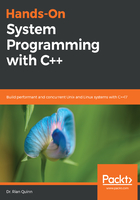
Summary
In this chapter, we learned about three different standards: C, C++, and POSIX. The C standard defines the popular C syntax, C-style program linking and execution, and the standard C libraries that provide cross-platform APIs to wrap an operating system's ABIs.
We also learned about the C++ standard, and how it defines the C++ syntax, program linking and execution, and the high-level C++ APIs that wrap underlying C and POSIX APIs to C++.
Finally, we saw how the POSIX standard provides additional APIs that go beyond C. These APIs include (but are not limited to) memory management, networking, and threading. In general, the POSIX standard defines all the standards needed for an application to perform its functions in a cross-platform way on any POSIX-compliant operating system.
The remainder of this book will focus on the APIs defined in these standards, and how they can be used to perform system programming in C++17. In the next chapter specifically, we will cover the system types provided by C, C++, and POSIX, and how they affect system programming.